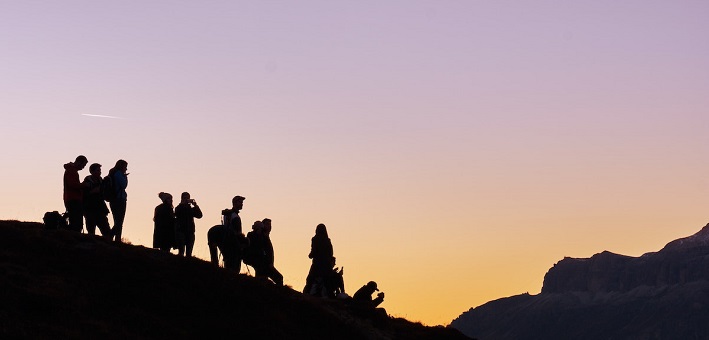Commentary on Exodus 16:2-4, 9-15
The large narrative arc of Exodus through Judges describes the liberation of the Hebrews from Egypt to settlement in Canaan. During this itinerary certain narratives recount the ways the Hebrews shared complaints with Moses and his God. Two large concerns dominate these narratives: food (Exodus 16:1-35; Numbers 11:4-34; 21:4-9; 11:1-3) and spring/water (Exodus 15:22-27; 17:1-7; Numbers 20:1-13). Sometimes these stories include etiology elements. However, no local etiology that would draw attention away from the theme of the dependence on God occurs in Exodus 16. The providence of God characterizes God’s guidance of the Hebrews in the wilderness.
This food narrative combines meat and bread, the latter a generalized metaphor for food. The wilderness stories recount the rebellion of the children of Israel: the rebellion against God and the priestly agents, in this case Moses and Aaron. Nonetheless, God is responsive and listens. God also provides provision despite the complaints.
The exodus story breaks the region into three options: Egypt, the wilderness, and the promised land. The wilderness is a liminal space between Egypt and the promised land. What happens in the wilderness stays in the wilderness. The stories from the wilderness become virtue stories for life in the promised land. The wilderness locates the rebellion outside the normal realms. Anthropologists such as Victor Turner have called this liminal space. Such liminal or edge space is not normal but shapes the normal.1 The issue of rejection of God and divine emissaries in the monarchy and exile make the wilderness stories into cautionary tales. The rise of a monarchy increased the disparity between the wealth of the king and the scarcity for those beyond the royal and priestly circle.
Initial complaint Exodus 16:2-4
The whole congregation participates in the rebellion and complaint against Moses and Aaron. The consensus of rebellion shapes the story.
They complain about the present reality of a troublesome liberation with a fictitious enslavement. The whole congregation addresses their speech to Moses and Aaron but implicates the LORD who delivered them. This pattern occurs in other wilderness wandering stories. The fictitious memory of enslavement “if only” posits death instead of life in liberation. Nonetheless, the second part of the speech recognizes God as the agent of history, “by the hand of the LORD.” However, the community misremembers enslavement as a time when enslaved persons sat by fleshpots and ate their fill of bread. The enslavement in Egypt likely was not the same as chattel slavery practiced in North America, nonetheless, it would be unlikely that enslaved persons receive all the food they wanted. The tone of the speech turns with a direct indictment of God as the one who brought the whole community into the wilderness for annihilation by hunger, not liberation. The whole congregation does not address God directly. The appetite for food made the people “hangry.”
But God responds to the speech of the community with a counter speech to Moses. God is going to make it rain. The culture of Israel knew rain as infrequent but necessary for life. The metaphor “raining cats and dogs” likely comes from a similar sounding Greek phrase cata doxa; contrary to belief that is unbelievably hard. The verb rain occurs in Genesis 7:4 in connection with the flood narrative, Exodus 9:18 with the plague of thunder and hail. God vows not only to “rain” but to rain “bread from heaven” a phrase that only occurs here. The bread from heaven is both gift and test: Can the people follow directions (Exodus 16:5-8)?
Exodus 16:9-15
The complaints come from everybody, and the instructions go to everyone. The hierarchy in the passage is clear. God speaks to Moses, who speaks in turn to Aaron, who speaks finally to the people. The imperative “draw near” metaphor couples with the accusation that God has heard the complaints of the whole congregation of Israel. The ongoing proximity of God made it possible for God to overhear. But that overhearing compels the community to draw near as a way to express solidarity with God.
As Aaron spoke to the whole congregation of Israel, they faced the wilderness evoking an appearance of God, a theophany in a cloud. It is almost as if while in the wilderness they did not see the wilderness, nor the God who accompanied them through that wilderness. Once again God speaks to Moses. God’s hearing of the complaints at this point in the story does not prompt divine anger as appears in Numbers 11. The instructions indicate that meat will be the evening meal and the other meal bread.
The biblical text often uses questions to point to the origin and nature of different aspects of life. Here is yet another example. The text provides an etiology to set forward how manna received its name. When people saw the frost like bread, they asked the question, “What is it?” Moses responded to the question with the confession that this was the bread that God provided. The theme of divine providence recurs throughout the wilderness wandering stories.
The bread of heaven accentuates the power and generosity of God. It also critiqued the monarchy of Israel and Judah. The rhetoric of an economy of scarcity persists in the contemporary season of COVID disparity, manifesting itself in toilet paper shortages among other products. The metaphor of bread from heaven provides a counter-narrative to scarcity we experience.
Notes
- Victor Turner, The Ritual Process: Structure and Anti-Structure (Chicago: Aldine, 1969).


August 1, 2021